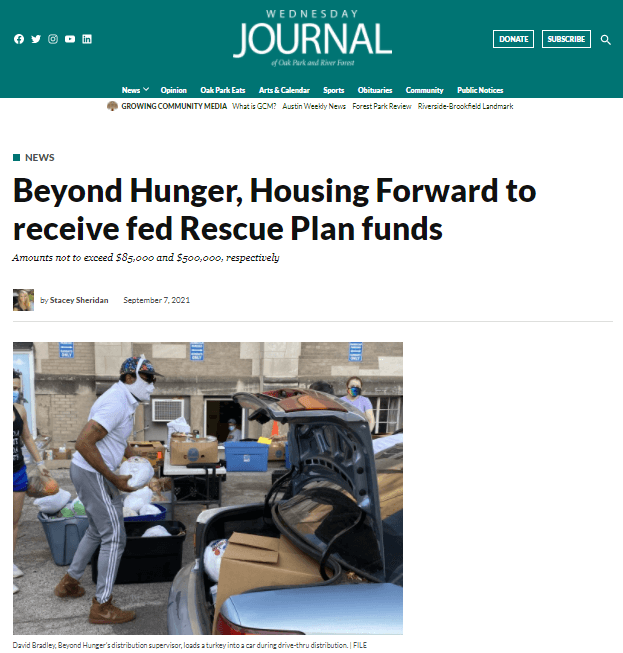In the News: Beyond Hunger, Housing Forward to receive fed Rescue Plan funds
Beyond Hunger, Housing Forward to receive fed Rescue Plan funds
Amounts not to exceed $85,000 and $500,000, respectively
by Stacey Sheridan
September 7, 2021
David Bradley, Beyond Hunger’s distribution supervisor, loads a turkey into a car during drive-thru distribution. | FILE
Beyond Hunger and Housing Forward will each receive a portion of the federal funds allotted to the village of Oak Park through the America Rescue Plan Act. Out of $38.9 million Oak Park is set to receive, the village will share a not-to-exceed amount of $85,000 with Beyond Hunger and $500,000 with Housing Forward, as decided by the village board Aug. 30.
While many village board members expressed disappointment that the resolutions were brought to the board table without giving the public an opportunity to provide feedback, the virtue of the work being done by both non-profits and the prevailing need for it to continue quieted concerns. Both resolutions passed unanimously.
Beyond Hunger Executive Officer Michele Zurakowski said the bulk of the $85,000 would go toward staffing at the food pantry. Due to the increased need for services, the food pantry converted three existing positions from part time to full time: the pantry coordinator, volunteer manager and pantry programs manager. Beyond Hunger also added a full-time home delivery coordinator.
In public comment, Zurakowski said clients are still uncomfortable visiting the food pantry in person and are eager for alternative procurement options to continue, such as drive-thru pick up, which has proven popular.
Past funding allowed the food pantry to extend its referral partnerships to include organizations beyond Oak Park township, like Thrive Counseling Center, according to Zurakowski.
She told the board the number of Oak Park residents utilizing the food pantry, which anyone can access once a month without referral, has grown considerably during the pandemic.
“What we’re seeing is an increase in Oak Parkers who are doing that – both people who are needing food and in the number of times that they access services,” she said. “They now represent 20 percent of repeat food pantry guests up from about 12 percent pre-pandemic.”
Referencing the disparate impact COVID-19 has had on Black and Brown communities, Zurakowski told the board Beyond Hunger engages those communities to determine their food needs and how they would like to receive support.
The client advisory council, comprised of program participants, has been meeting monthly or bi-monthly throughout the pandemic, making hundreds of wellness check calls and conducting multiple surveys.
“What we’ve found through that work is that overwhelmingly people appreciate the variety and quality of protein and fresh produce, and they’d like to see even more of those hard-to-get products,” she said.
Beyond Hunger is now looking to curate specialty food boxes, according to Zurakowski, such as gluten-free food packages for people with gluten intolerance and packages with Latin foods and flavors.
“And the latter is being tested in a special pop-up pantry,” said Zurakowski.
The pop-up is an effort by Beyond Hunger to target Latinx immigrants, she said. As many immigrants are fearful of any agency requiring individual documentation, Zurakowski said members of the community reached out to request the service, which requires no identification
Beyond Hunger found that, while Latinx immigrants were frightened of data sharing, older Black adults were afraid to leave their homes during COVID-19. “Racist employment, home finance and covenant policies created a wealth gap,” said Zurakowski, that left older Black adults few resources to fall back on, increasing the demand for home deliveries in this demographic, which tripled in one month.
“While initially we thought the need would diminish that has not been the case,” said Zurakowski.
Beyond Hunger makes calls to every home delivery client each month to take food orders and conduct wellness checks. Those calls she described as “heartbreaking and affirming” at the same time.
She called the timing of the release of federal Rescue Plan funds “fortuitous,” as it coincides with the sunset of such federal assistance as the eviction moratorium and unemployment benefits, adding that Beyond Hunger is already feeling the impact as pantry usage has risen in anticipation.
“We expect that need will continue to build,” said Zurakowski.
Housing Forward, an organization committed to ending homelessness, had to change operations considerably due to COVID-19. The highly contagious nature of the virus prompted Housing Forward to not only abandon its rotating church-based shelter model, but group shelters completely. The rotating shelter model had been in use for 27 years. Clients instead were put up in hotel rooms to allow for social distancing and, when necessary, isolation.
Housing Forward Executive Director Lynda Schueler told the village board that the $500,000 would allow for the extension of the organization’s flexible rental program. The program exhausted its funds, which came from the village’s affordable housing fund, last December, according to Schueler.
The federal Rescue Plan funds, she said, would also allow Housing Forward to hire a full-time case manager to oversee clients who have been rehoused with mainstream housing vouchers through the organization’s partnership with the Oak Park Housing Authority in conjunction with members of the Oak Park Homelessness Coalition.
“Those [clients] are individuals who have actually been rehoused but they don’t right now have the service piece connected to their long-term rental subsidy through those vouchers,” said Schueler.
Housing Forward also looks to use its Rescue Plan money to support a three-flat the organization rented for about a year, according to Schueler, for large families who are better served in a residential setting than hotel. The flat’s lease renewal is approaching.
Schueler told Wednesday Journal the $500,000 in ARPA funds would not go toward the cost of leasing out the Write Inn hotel for another year. The organization entered into a year-long lease for the full use of the hotel last September to house clients in its interim housing program.
